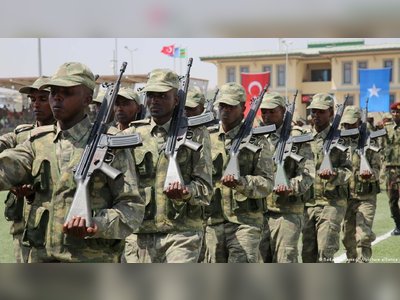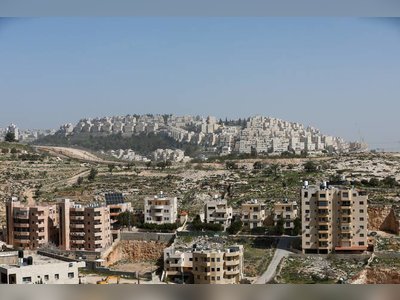
Fragile Israel-Hamas Ceasefire Enters Second Week Amid Hostage Exchanges and Tensions
The truce, now in its second week, has seen the release of hostages and prisoners, but disputes over the return of displaced Palestinians and the pace of negotiations raise concerns about its stability.
A fragile ceasefire between Israel and Hamas has entered its second week, following the release of four Israeli hostages and approximately 200 Palestinian prisoners.
The exchange, which took place on Saturday, was part of a truce agreement aimed at ending the 15-month conflict in Gaza.
The released hostages—Karina Ariev, Daniella Gilboa, Naama Levy, and Liri Albag—were all Israeli Defense Forces (IDF) soldiers who had been held captive since Hamas's attack on October 7, 2023. They were handed over to the International Committee of the Red Cross (ICRC) in Gaza City and subsequently reunited with their families in Israel.
In exchange, Israel released 200 Palestinian prisoners, marking the second such swap under the ceasefire agreement.
The first exchange occurred earlier in the week, involving the release of three hostages for 90 Palestinian prisoners.
Despite these developments, tensions have surfaced over the return of displaced Palestinians to the northern Gaza Strip.
Israel announced that it would block Palestinians' passage to the north until a civilian woman hostage, Arbel Yehud, is released.
Hamas has indicated that Yehud will be released as part of the third swap scheduled for next Saturday.
This dispute underscores concerns about the next phases of the truce, which is structured in three stages.
The first phase involves the release of hostages and prisoners, the second phase focuses on negotiations for a permanent end to the war, and the third phase aims to address humanitarian issues and reconstruction.
Analysts have warned that the truce's multi-phase nature and the deep mistrust between Israel and Hamas could lead to its collapse.
During the first phase, 33 hostages are expected to be freed in staggered releases in exchange for around 1,900 Palestinians held in Israeli jails.
To date, seven hostages and 289 Palestinians have been released under the deal, along with one Jordanian prisoner freed by Israel.
In Gaza, Palestinian police have prevented hundreds of displaced people from reaching the Israeli-controlled passage to the north, where Israeli tanks and armored vehicles are blocking the road.
The Israeli military's Arabic-language spokesman stated that Gazans are not allowed to approach the Netzarim Corridor until it is announced open, citing Hamas's failure to fulfill its commitments.
The truce has facilitated the entry of humanitarian aid into Gaza, including food, fuel, and medicines.
However, the United Nations has stated that the humanitarian situation remains dire.
The four hostages released on Saturday were all women soldiers, who were reunited with their families and taken to hospital, where a doctor reported they were in stable condition.
Of the 251 hostages seized during Hamas's October 7, 2023 attack, 87 remain in Gaza, including 34 the military says are dead.
Some Israelis fear for the fate of the remaining hostages, as far-right members of Prime Minister Benjamin Netanyahu's ruling coalition oppose the ceasefire.
Hours after Saturday's hostage release, thousands of protesters gathered in Tel Aviv to pressure the authorities to secure the release of hostages.
The October 7, 2023 attack resulted in the deaths of 1,210 people, mostly civilians, according to an AFP tally based on official Israeli figures.
Israel's retaliatory offensive has killed at least 47,283 people in Gaza, the majority civilians, according to figures from the Hamas-run territory's health ministry, which the United Nations considers reliable.
As the ceasefire continues, the international community remains watchful, hoping that the truce will lead to a lasting resolution to the conflict.
However, the recent disputes and the complex nature of the agreement highlight the challenges ahead in achieving a permanent peace.
The exchange, which took place on Saturday, was part of a truce agreement aimed at ending the 15-month conflict in Gaza.
The released hostages—Karina Ariev, Daniella Gilboa, Naama Levy, and Liri Albag—were all Israeli Defense Forces (IDF) soldiers who had been held captive since Hamas's attack on October 7, 2023. They were handed over to the International Committee of the Red Cross (ICRC) in Gaza City and subsequently reunited with their families in Israel.
In exchange, Israel released 200 Palestinian prisoners, marking the second such swap under the ceasefire agreement.
The first exchange occurred earlier in the week, involving the release of three hostages for 90 Palestinian prisoners.
Despite these developments, tensions have surfaced over the return of displaced Palestinians to the northern Gaza Strip.
Israel announced that it would block Palestinians' passage to the north until a civilian woman hostage, Arbel Yehud, is released.
Hamas has indicated that Yehud will be released as part of the third swap scheduled for next Saturday.
This dispute underscores concerns about the next phases of the truce, which is structured in three stages.
The first phase involves the release of hostages and prisoners, the second phase focuses on negotiations for a permanent end to the war, and the third phase aims to address humanitarian issues and reconstruction.
Analysts have warned that the truce's multi-phase nature and the deep mistrust between Israel and Hamas could lead to its collapse.
During the first phase, 33 hostages are expected to be freed in staggered releases in exchange for around 1,900 Palestinians held in Israeli jails.
To date, seven hostages and 289 Palestinians have been released under the deal, along with one Jordanian prisoner freed by Israel.
In Gaza, Palestinian police have prevented hundreds of displaced people from reaching the Israeli-controlled passage to the north, where Israeli tanks and armored vehicles are blocking the road.
The Israeli military's Arabic-language spokesman stated that Gazans are not allowed to approach the Netzarim Corridor until it is announced open, citing Hamas's failure to fulfill its commitments.
The truce has facilitated the entry of humanitarian aid into Gaza, including food, fuel, and medicines.
However, the United Nations has stated that the humanitarian situation remains dire.
The four hostages released on Saturday were all women soldiers, who were reunited with their families and taken to hospital, where a doctor reported they were in stable condition.
Of the 251 hostages seized during Hamas's October 7, 2023 attack, 87 remain in Gaza, including 34 the military says are dead.
Some Israelis fear for the fate of the remaining hostages, as far-right members of Prime Minister Benjamin Netanyahu's ruling coalition oppose the ceasefire.
Hours after Saturday's hostage release, thousands of protesters gathered in Tel Aviv to pressure the authorities to secure the release of hostages.
The October 7, 2023 attack resulted in the deaths of 1,210 people, mostly civilians, according to an AFP tally based on official Israeli figures.
Israel's retaliatory offensive has killed at least 47,283 people in Gaza, the majority civilians, according to figures from the Hamas-run territory's health ministry, which the United Nations considers reliable.
As the ceasefire continues, the international community remains watchful, hoping that the truce will lead to a lasting resolution to the conflict.
However, the recent disputes and the complex nature of the agreement highlight the challenges ahead in achieving a permanent peace.






